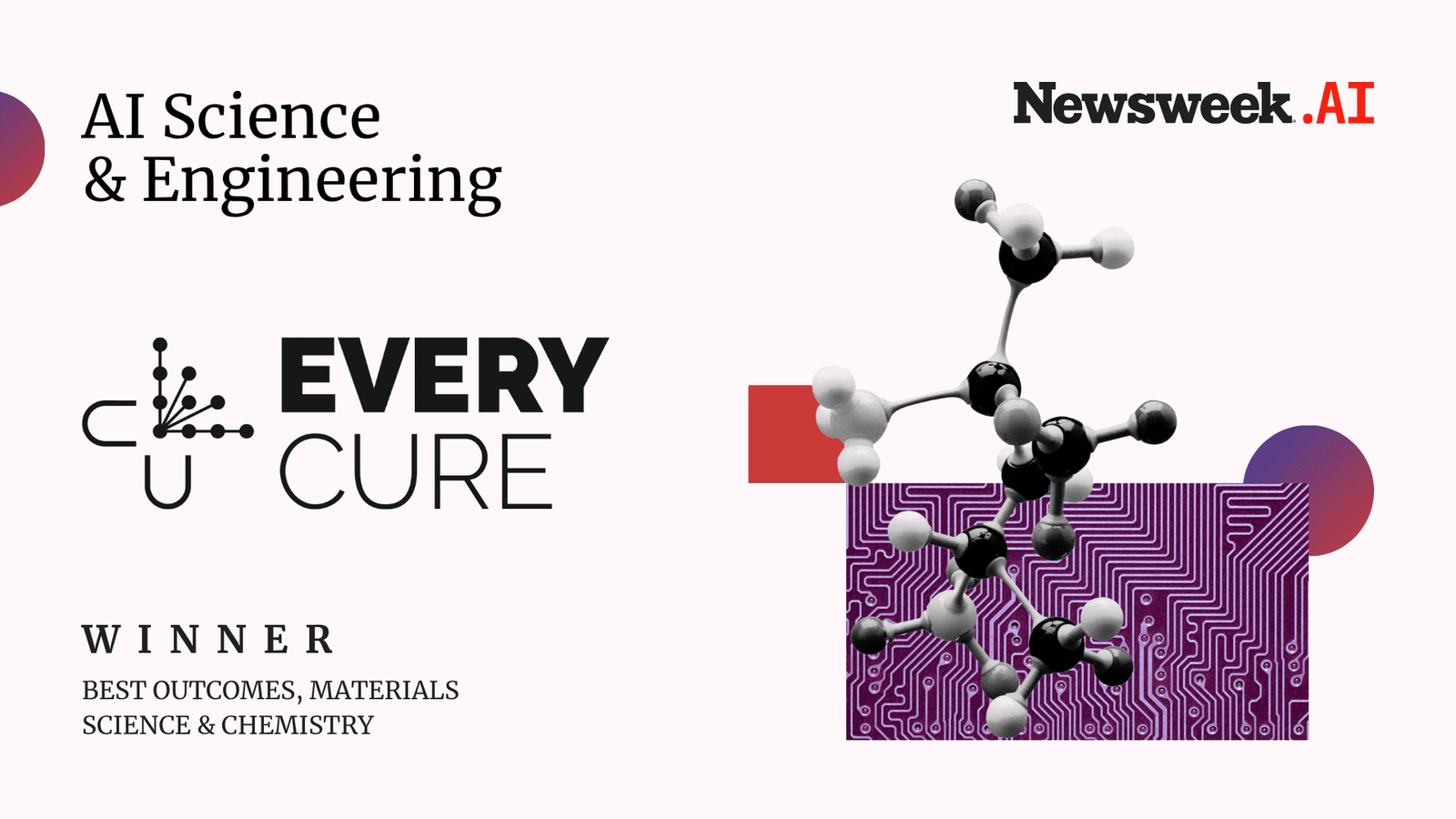Every Cure, a nonprofit working to reveal the untapped potential of existing medications, has emerged as the overall winner of Newsweek’s inaugural AI Impact Awards.
The AI Impact Awards evaluated AI solutions across several business sectors, including health care, mobility, workplace and education. Winners were celebrated for pursuing big ideas that generated significant impacts when put into practical use.
A cross-industry panel of expert judges—including AI leaders from UMass Memorial Health, Bayer, Bezos Earth Fund and the U.S. Department of Defense—evaluated applicants, and voted Every Cure as the overwhelming favorite. The organization also took home the gold in the Best Outcomes, Materials Science and Chemistry category, earning accolades for its AI-powered approach to drug repurposing.
Newsweek Illustration
Every Cure was founded by Dr. David Fajgenbaum and Dr. Grant Mitchell in 2010, in response to a personal crisis. As a third-year medical student, Fajgenbaum was diagnosed with Castleman disease, a rare and deadly illness with no approved treatments.
“We didn’t have 10 years and a couple billion dollars to develop a new drug,” Mitchell told Newsweek.
The roommates’ only hope was that they could “repurpose an existing drug, and that it might work for him,” Mitchell added.
Fortunately, the pair’s research revealed that a decades-old kidney transplant drug, sirolimus, could treat Fajgenbaum’s condition. That success sparked a realization. Thousands of lifesaving therapies may already exist, hidden in plain sight on pharmacy shelves.
Today, Every Cure is working to systematically uncover and validate those hidden opportunities using artificial intelligence. Its proprietary platform, MATRIX (Therapeutic Repurposing in eXtended uses), was designed to assess and rank roughly 75 million drug-disease combinations, prioritizing high-potential therapies with speed and scale that would be unimaginable without AI.
The AI model recommends the drug-disease combinations that are most likely to work biologically and reduce suffering for a significant number of people. Then, Every Cure can pursue that combination with a low-cost trial or study.
“We let the data guide us towards the highest-impact opportunities,” Mitchell said.
In 2024, Every Cure began advancing more than eight promising repurposing projects. Among the most striking examples was its AI model’s identification of adalimumab, a drug commonly used for autoimmune conditions, as another potential treatment for Castleman disease (the condition that inspired the company’s founders). That prediction put a terminally ill patient into remission and was published in the New England Journal of Medicine.
Another success involved leucovorin (a derivative of folate), which helped restore speech in children with a subtype of autism by bypassing a biochemical blockade.
“We had parents send in videos and tell stories of their kids who have never spoken or expressed their feelings before, 1750245706 saying, ‘Daddy, I love you,'” Mitchell said. “It’s just been really awesome to see that kind of impact.”
Every Cure’s platform doesn’t stop at prediction. It also uses AI to evaluate and rank evidence from scientific literature and electronic health records—the systems that hospitals use to manage patient records—to support clinical trial planning. The company’s team of more than 40 data scientists, engineers and MD/PhD medical experts also collaborates closely with patient advocacy groups, contract research organizations and tech partners like Google Cloud and Komodo Health. This cross-disciplinary model ensures that discoveries are not only scientifically sound, but aligned with patient needs and ready for real-world adoption.
One of the nonprofit’s most surprising findings? Many effective therapies are already backed by sufficient evidence. They simply lack visibility. In these cases, Mitchell said, no new clinical trial is necessary. Researchers just need to repackage the existing evidence and update clinical guidelines so that patients and physicians know the treatment is available.
“We refer to low-hanging fruit all the time—this fruit is just sitting on the forest floor,” Mitchell said.
To guarantee safe and responsible dissemination, Every Cure developed tiered disclosure systems for researchers and the public. A public-facing web tool is slated for release in 2026, and will allow clinicians and advocates to explore the database of predictions.
Every Cure’s momentum is accelerating. The company is supported by a $48.3 million contract from the Advanced Research Projects Agency for Health and $60 million from the TED-backed Audacious Project.
Its goals are also ambitious: to launch 15 to 25 validated repurposing projects by 2030, shift clinical guidelines, and offer new hope to patients who have long been overlooked by the pharmaceutical industry.
With AI as its engine, Every Cure suggests that the future of medicine may lie in rediscovering what we already know—and using it far more wisely.
“How many times did we walk past a local CVS and that pill was just sitting there while David [Fajgenbaum] was suffering and thousands of people were dying?” Mitchell said. “We became obsessed with this idea that the drugs that we have—that humanity has put so much effort into bringing to to market and helping patients with—are not fully utilized to treat every disease that they possibly can.”
To see the full list of winners and awards, visit the official page for Newsweek’s AI Impact Awards.
Newsweek will continue the conversation on meaningful AI innovations at our AI Impact Summit from June 23 to 25 in Sonoma, California. Click here for more information and to register for the event.










